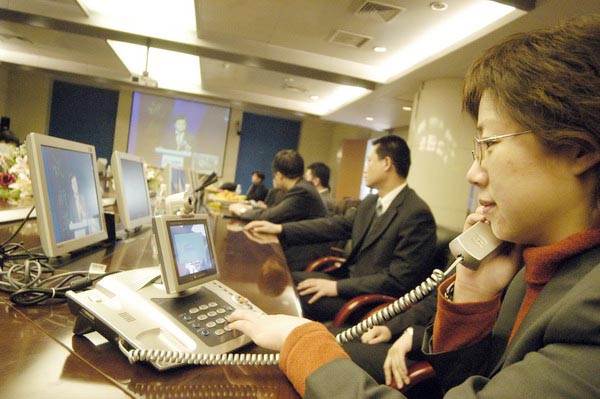Unified communications provider Polycom Inc is expecting its mobility solutions to cement the company's lead in the Chinese market, where the demand for business video-conferencing equipment could hit 2 billion yuan ($315 million) by 2015.
"The development of video conferencing technology has penetrated into people's everyday lives. The applications for mobile phones and iPads enabled easier ways to communicate with colleagues and friends," said Sudhakar Ramakrishna, president of products and services at Polycom.
|
 China Unicom employees domestrating the company's video-conferencing technology at a promotion in Harbin, the capital city of Northeast China's Heilongjiang province. Video-conferencing innovation now involves smaller screens such as personal computers, smartphones and tablets that workers use in their everyday jobs. [Photo/China Daily] |
Video-conferencing innovation is happening on smaller screens such as personal computers, smartphones, and tablets that workers use in their everyday jobs, said a Forrester Research Inc report released on Aug 21.
Polycom is pushing RealPresence Mobile services, enabling video conferencing on mobile devices using IOS and Android systems.
But the California-based company does not think its mobility strategy will reduce hardware sales. Even when the penetration rate of mobile devices equals the level of in-house communication suites, the hardware equipment will continue to sell, it said.
"We look at RealPresence Mobile as an expansion of the market. We are expanding market opportunities," said Ramakrishna, adding that the development of mobile software will increase the sales of hardware products because the mobile apps offered customers more options.
China's enterprise smartphone users will grow about 30 percent year-on-year in coming years. The nation's total mobile phone subscriptions are around 1 billion, Ramakrishna estimated.
In response to the growing interest, vendors not only have to show strategies that account for desktop and mobile applications, they also have to make their traditional room-based systems easier to deploy at scale, said the Forrester report.
Polycom said it has taken more than 51 percent of China's video-conferencing market.
"The way to expand is not to have a high market share in a small market but to take a high market share in a large market. So our focus is to make the market size larger," said Ramakrishna.
In late July, Swiss hardware accessories maker Logitech International SA announced its plan to enter China's enterprise communication market after executives estimated demand could hit 2 billion yuan in the next three years.
Although Ramakrishna agreed that China is one of the world's fastest growing markets globally, he did not believe there is a company - international corporations or local enterprises - that could challenge Polycom's leading position in China.
"The way we maintain our edge is by using the resources of a global company but behaving like a local company. We are building specific products for local customers. Maybe there is no customer in the world that requires that but it does not matter to us because China is an important market for us."
As for Logitech, its video division was roughly a tenth the size of Polycom in terms of revenue, according to Ramakrishna. "We have much bigger scale and much bigger presence and many more resources to support Chinese customers."
Polycom also pledged to bring its engineering team in China up to at least 300 people by the end of this year. The engineers will mainly be responsible for developing localized products for Chinese customers. The company had fewer than 200 engineers in the country last year.
The growing interest in face-to-face video collaboration will help customers to increase productivity, improve employee engagement and lower costs, said Ramakrishna.
gaoyuan@chinadaily.com.cn
